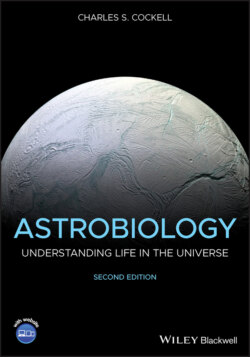Читать книгу Astrobiology - Charles S. Cockell - Страница 51
Focus: Astrobiologists: Andreas Elsaesser
ОглавлениеAffiliation: Experimental Biophysics and Space Science, Freie Universität Berlin, Germany
What was your first degree? I obtained a German “Diplom” (equivalent to MSc) in Physics from the Technical University Munich (Germany) and specialized in astrophysics and nuclear physics, while my master's thesis focused on low temperature plasma physics.
What do you study? The main focus of my research is the interaction of radiation with soft matter, organic molecules, and biological systems. I am interested in biomarker (photo)stability, organic mineral interaction, life detection on other planets and moons, habitability, origin of life, and its limits.
What science questions do you address? With my research, I aim to address questions in relation to the evolution and distribution of life in our Solar System and in other parts of the Universe. More specifically, I would like to understand better: How could we possibly detect life on other planets? What molecular signature should we search for? What are the chances of finding extraterrestrial life, and how common is it?
How did you get involved in astrobiology research? I have always been fascinated by the questions of how life evolved on Earth and whether life could be found elsewhere in the Universe. However, only after my PhD in the field of Nano-Biophysics at the University of Ulster (United Kingdom) did I get closely involved in astrobiology research. It was my first postdoctoral position at Leiden University (The Netherlands), where I studied the photostability of organic molecules and potential biosignatures in the laboratory and in space. From then on, I developed my own line of research with projects in the fields of astrobiology and astrochemistry, and today I lead my own research group for biophysics and space sciences at Freie Universität Berlin (Germany).
Photo: Daniel Kunzfeld for VolkswagenStiftung
